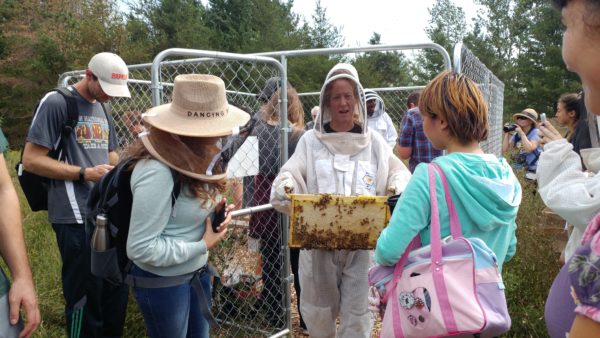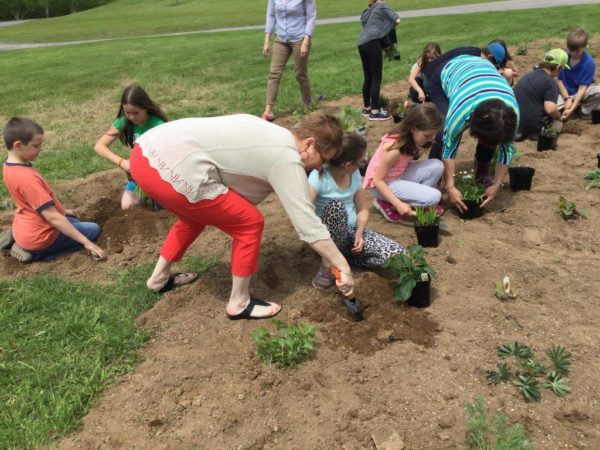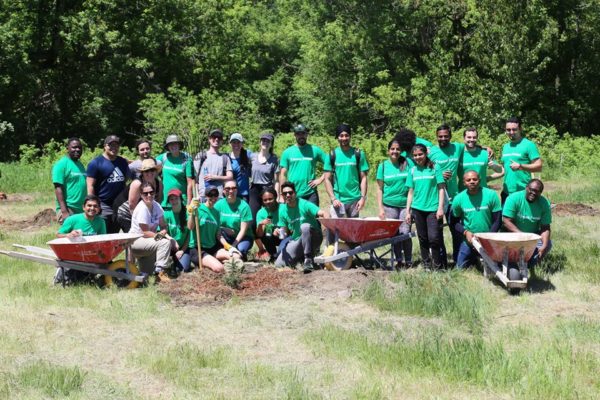Canadians Go Wild for nature

From coast to coast to coast, Canadian students are taking action and making their voices heard in pushing for solutions to climate change. They are also stepping up to play their part in helping nature and wildlife thrive through educational, hands-on projects. WWF-Canada’s Go Wild School Grants help students bring those projects to life!
Each year, we ask students and educators to share their ideas to help nature thrive, with a chance for up to $500 to create those projects for their school community. This year we are celebrating 50 Go Wild recipients that include elementary, secondary, university and college students. From creating habitats to support Canadian wildlife, to building gardens with native plants, students across Canada are contributing to a sustainable future.
“I grew up in nature at home surrounded by beautiful trees and plants. The green roof at Frost campus helps to connect me to home when I am away at school. When I am at home, I feel safe, comfortable, and happy and I feel like that when I am at Frost and on the green roof. I believe every student should be able to benefit from that and feel the same way while at school.” – Edie Russell, 2018-2019 Go Wild School Grant recipient.
Here are some of the ways students and educators are leading the way with their Go Wild School Grant:

Creating native gardens—Fredericton, NB, Gibson – Neill Memorial Elementary
Students will research, design and plant a pollinator garden using native species. By creating this wild space for nature and building butterfly houses, students will help support the local butterfly population and witness wildlife they normally wouldn’t see on school grounds.
Sackville High outdoor classroom—Lower Sackville, NS – Sackville High School
This project will restore a current outdoor classroom for learning and discovery by creating interactive signage about the local environment, planting pollinator species, and allowing the local community to access and enjoy the seating area near the local trail system.
Beehives expansion and signage—Toronto, ON – Seneca College
Newnham Campus is already home to over 30 thriving beehives, and that’s just the start. While installing more bee homes to increase the pollinator population of the school, campus staff and students will engage and educate others on how these pollinators help their surrounding habitat and enhance biodiversity. They aim to inspire more students to get involved in supporting these pollinators.

Pride of York—Toronto, ON – York University
The Pride of York project aims to create a diverse set of student-run programs and initiatives that inspire high school students and community members to create local solutions to environmental issues and together achieve UN Sustainable Development Goals. By creating these educational workshops, students from York University will have the opportunity to develop their skills in teamwork, leadership, community engagement and more.

Êtres les architectes pour la nature—Sant-Laurent, QC – École Des Grands
Eager to help wildlife, primary students will build bird feeders from recycled materials. The bird feeders will be placed around the school from November to end of March In the spring, students will observe their progress and see if the bird feeders are being used.
Harmonisation des bassins de rétentions à l’écosystème urbain—Drummondville, QC – École Jean-Raimbault
The students at École Jean-Raimbault will be collaborating with community members and the local municipality to learn how to successfully restore this aquatic habitat and re-generate wildlife habitat. By integrating water retention basins and adding nesting boxes, insect hotels, reptile and amphibian floating blocks, students will be making a difference in their local community.
Go batty for bat boxes—Kelowna, BC – Studio9 Independent School of the Arts
British Columbia’s bat populations will get some assistance from elementary and secondary students who will construct and distribute bat boxes and bee houses throughout the local community. Students will conduct research, build the boxes and houses, record their field observations, and learn how to improve this local habitat.
Check out all our 2019 Go Wild School Grant winners for Living Planet @ School and Living Planet @ Campus, and get inspired to bring your ideas to life for the next application season!
